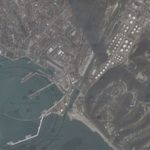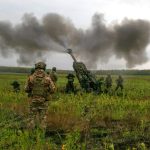On the night of 15 February, approximately 14 rockets landed in Erbil, the capital of Iraq’s Kurdistan Regional Government (KRG).
TARGET: ERBIL
Three projectiles hit the military annex of Erbil International Airport that the Coalition built to service counter-ISIS operations. Three housing facilities were destroyed in the attack, killing one contractor (non-US) and injuring others.

Battle Damage Assessment: Contractor housing facilities destroyed at Erbil Air Base
At least two other rockets landed in residential areas, destroying public and private properties and injuring bystanders.
Geolocation of a “stray rocket” that hit a neighbourhood in Erbil city – 1 of (aprox) 14 rockets that were launched last night. Three rockets hit Coalition mil. area at #Erbil Airport (per @OIRSpox). “Saraya Awliya al-Dam” group claimed responsibility.https://t.co/P8BGuhbgWN https://t.co/MomFGYbxsT pic.twitter.com/kAD0x91xEd
— T-Intelligence (@T_intell) February 16, 2021
IRANIAN ROCKETS
The unexploded ammunition recovered by Kurdish counter-terrorism forces is identical to the Iranian-made “Haseb” 107mm rocket artillery, a copy of the Chinese Type 63. This type of munition is ubiquitous among Iraqi Shiite militias courtesy of the IRGC-Quds Force.

Iranian rockets used in the attack
The Haseb has a short-range (7-10 km), which meant the aggressors launched the attack from proximity. As Haseb rockets can be launched from the back of a minivan or pick-up truck, they can easily be smuggled in denied areas.
دەزگا ئەمنییەکان ئەو ئۆتۆمبێلەیان دۆزییەوە کە مووشەکەکانی ئاراستەی هەولێر کردبوو
بە گوێرەی زانیارییەکانی پەیجی…
Posted by دژه تیرۆری کوردستان Kurdistan CT on Monday, February 15, 2021
Images released by Kurdish authorities show the launch vehicle, a light food truck, with a disguised rocket artillery system. The vehicle appears to have infiltrated the city under the cover of delivering food to a local market.
USUAL SUSPECTS: IRAQI SHIITE MILITIAS
A group calling itself “Saraya Awliya al-Dam” (Custodians of the Blood) claimed responsibility for the attack. According to the Washington Institute, Saraya Awliya al-Dam is just a cover used by Asaib al-Haq (AHH), a seasoned Iraqi Shiite militia with strong ties with Iran. The U.S. Department of State designated AHH as a Foreign Terrorist Organization on January 3, 2020.
Iranian-backed attacks on Coalition forces in Iraq are not new. The targeting of Erbil is, however, largely unprecedented (the Sept 2020 attack is the only exception) and could indicate an expansion of Iranian-approved targets. If that’s the case, Iraq’s most stable area is now in Tehran’s crosshairs.
Founder of T-Intelligence. OSINT analyst & instructor, with experience in defense intelligence (private sector), armed conflicts, and geopolitical flashpoints.





